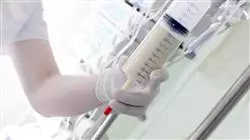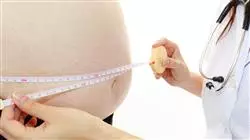University certificate
Accreditation/Membership

Accreditation/Membership
The world's largest faculty of nursing”
Introduction to the Program
Acquire the necessary skills and competencies to work in nursing in the area of Clinical Nutrition with a high-intensity Master's program"

This complete study course goes in depth into the nutritional problems most frequently presented by patients, addressing different techniques for assessment and nursing diagnoses. It will allow the nursing professional to adapt this knowledge to each patient, using the entire suggested plan and supplementing it with his or her own experiences.
With this Master's Degree, nurses will develop their skills and knowledge of the different health problems in Clinical Nutrition. A unique opportunity to be trained by great working professionals, with the best didactic resources and practical cases based on real clinical situations.
Specialization in nutrition is the essential response of the professional to the needs of the population in terms of food and health care and prevention. An example of this is the growing implementation of Nutrition and Dietetics Units or Services in Spanish Hospitals, where the figure of the nurse takes on special relevance in the assessment of nutritional status and the planning and execution of particular nursing care for each patient.
Currently, there is a high demand for nurses with specific knowledge in Clinical Nutrition in the following areas:
- Food processing industries
- Food quality control laboratories
- Medical and pharmaceutical visitor
- Food, nutrition and dietetics consultancy companies
- Sports centers and esthetic clinics
- Group canteens, catering services, hotels, schools, etc.
- Food handling training programs
- Centers for the Prevention and Treatment of Eating Disorders
With this program, you will have the opportunity to study a program that brings together the most advanced and in-depth knowledge in the field, where a group of professors of high scientific rigor and extensive international experience provides you with the most complete and up-to-date information on the latest advances and techniques in Clinical Nutrition for Nursing.
A program created and directed by expert professionals in Clinical Nutrition that make this Master's Degree a unique opportunity for professional growth"
This Master's Degree in Clinical Nutrition for Nursing contains the most complete and up-to date scientific program on the market. The most important features include:
- The graphic, schematic and practical contents of the course are designed to provide all the essential information required for professional practice
- It contains exercises where the self-assessment process can be carried out to improve learning
- Algorithm-based interactive learning system for decision-making for patients with feeding problems
- Nursing care guidelines on the different pathologies related to nutrition
- All of this will be complemented by theoretical lessons, questions to the expert, debate forums on controversial topics, and individual reflection assignments
- Content that is accessible from any fixed or portable device with an Internet connection
This Master's Degree may be the best investment you can make in the selection of a refresher program for two reasons: in addition to updating your knowledge in advanced clinical nutrition, you will obtain a Master's Degree from TECH Global University"
Its teaching staff includes renowned specialists in nutrition based on clinical practice, who bring the experience of their work to this program.
The multimedia content developed with the latest educational technology will provide the professional with situated and contextual learning, i.e., a simulated environment that will provide an immersive program to study in real situations.
This program is designed around Problem-Based Learning, whereby the nursing professional must try to solve the different professional practice situations that arise throughout the program. For this reason, you will be assisted by an innovative, interactive video system created by renowned and experienced experts in the field of radiology with extensive teaching experience.
You will be able to complete the Master's Degree 100% online, adapting it to your needs and making it easier for you to take it while you carry out your full-time healthcare role"

The learning experience on this Master's Degree follows the most developed didactic methods in online teaching to guarantee your efforts lead to the best results possible"
Why study at TECH?
TECH is the world’s largest online university. With an impressive catalog of more than 14,000 university programs available in 11 languages, it is positioned as a leader in employability, with a 99% job placement rate. In addition, it relies on an enormous faculty of more than 6,000 professors of the highest international renown.

Study at the world's largest online university and guarantee your professional success. The future starts at TECH”
The world’s best online university according to FORBES
The prestigious Forbes magazine, specialized in business and finance, has highlighted TECH as “the world's best online university” This is what they have recently stated in an article in their digital edition in which they echo the success story of this institution, “thanks to the academic offer it provides, the selection of its teaching staff, and an innovative learning method aimed at educating the professionals of the future”
A revolutionary study method, a cutting-edge faculty and a practical focus: the key to TECH's success.
The most complete study plans on the university scene
TECH offers the most complete study plans on the university scene, with syllabuses that cover fundamental concepts and, at the same time, the main scientific advances in their specific scientific areas. In addition, these programs are continuously being updated to guarantee students the academic vanguard and the most in-demand professional skills. In this way, the university's qualifications provide its graduates with a significant advantage to propel their careers to success.
TECH offers the most comprehensive and intensive study plans on the current university scene.
A world-class teaching staff
TECH's teaching staff is made up of more than 6,000 professors with the highest international recognition. Professors, researchers and top executives of multinational companies, including Isaiah Covington, performance coach of the Boston Celtics; Magda Romanska, principal investigator at Harvard MetaLAB; Ignacio Wistumba, chairman of the department of translational molecular pathology at MD Anderson Cancer Center; and D.W. Pine, creative director of TIME magazine, among others.
Internationally renowned experts, specialized in different branches of Health, Technology, Communication and Business, form part of the TECH faculty.
A unique learning method
TECH is the first university to use Relearning in all its programs. It is the best online learning methodology, accredited with international teaching quality certifications, provided by prestigious educational agencies. In addition, this disruptive educational model is complemented with the “Case Method”, thereby setting up a unique online teaching strategy. Innovative teaching resources are also implemented, including detailed videos, infographics and interactive summaries.
TECH combines Relearning and the Case Method in all its university programs to guarantee excellent theoretical and practical learning, studying whenever and wherever you want.
The world's largest online university
TECH is the world’s largest online university. We are the largest educational institution, with the best and widest online educational catalog, one hundred percent online and covering the vast majority of areas of knowledge. We offer a large selection of our own degrees and accredited online undergraduate and postgraduate degrees. In total, more than 14,000 university degrees, in eleven different languages, make us the largest educational largest in the world.
TECH has the world's most extensive catalog of academic and official programs, available in more than 11 languages.
Google Premier Partner
The American technology giant has awarded TECH the Google Google Premier Partner badge. This award, which is only available to 3% of the world's companies, highlights the efficient, flexible and tailored experience that this university provides to students. The recognition as a Google Premier Partner not only accredits the maximum rigor, performance and investment in TECH's digital infrastructures, but also places this university as one of the world's leading technology companies.
Google has positioned TECH in the top 3% of the world's most important technology companies by awarding it its Google Premier Partner badge.
The official online university of the NBA
TECH is the official online university of the NBA. Thanks to our agreement with the biggest league in basketball, we offer our students exclusive university programs, as well as a wide variety of educational resources focused on the business of the league and other areas of the sports industry. Each program is made up of a uniquely designed syllabus and features exceptional guest hosts: professionals with a distinguished sports background who will offer their expertise on the most relevant topics.
TECH has been selected by the NBA, the world's top basketball league, as its official online university.
The top-rated university by its students
Students have positioned TECH as the world's top-rated university on the main review websites, with a highest rating of 4.9 out of 5, obtained from more than 1,000 reviews. These results consolidate TECH as the benchmark university institution at an international level, reflecting the excellence and positive impact of its educational model.” reflecting the excellence and positive impact of its educational model.”
TECH is the world’s top-rated university by its students.
Leaders in employability
TECH has managed to become the leading university in employability. 99% of its students obtain jobs in the academic field they have studied, within one year of completing any of the university's programs. A similar number achieve immediate career enhancement. All this thanks to a study methodology that bases its effectiveness on the acquisition of practical skills, which are absolutely necessary for professional development.
99% of TECH graduates find a job within a year of completing their studies.
Master's Degree in Clinical Nutrition for Nursing
In both general medicine and nursing, the treatment of digestive and/or nutritional diseases is a recurring topic. Conditions such as ulcerative colitis, gastritis, and chronic enteritis are common in approximately 50% of the Spanish population. Other global statistics provided by the WHO indicate that around 420,000 people die annually worldwide from foodborne diseases.It is essential to update healthcare professionals in this field in detail. For this reason, TECH Global University offers the Master's Degree in Clinical Nutrition for Nursing: a 100% online postgraduate program focused on optimizing curricular competencies related to nutrition, supported by innovative methodologies like the Relearning system, advanced interactive material, and a faculty with extensive experience in both nutrition and nursing. Here, you will learn in a self-regulated manner about a wide range of topics—from probiotics, prebiotics, and symbiotics to eating disorders such as anorexia and bulimia. Looking to grow professionally? TECH is your path.
Enhance your nursing career with this Master's Degree in Nutrition
How should you nutritionally treat a pediatric patient with cancer, allergies, or food intolerances? What parameters should the diet of someone with irritable bowel syndrome, hepatic encephalopathy, or a gastric ulcer follow? What benefits can we gain from nutrigenomics and nutrigenetics? These questions and many more can be answered through this postgraduate program. With a flexible and highly immersive learning experience, you can manage your studies according to your available time. You will explore various aspects of clinical nutrition, such as hospital dietetics, nutritional management in patients with digestive and endocrine-metabolic diseases, dietary guidelines for sports practice, and new advances in nutrition, among many other valuable topics. You are presented with a unique offering built on the most sophisticated distance higher education. You can even complete your studies by viewing lessons and archive material from your smartphone with an internet connection. If you want to enhance your resume, TECH is the best option on the market.







